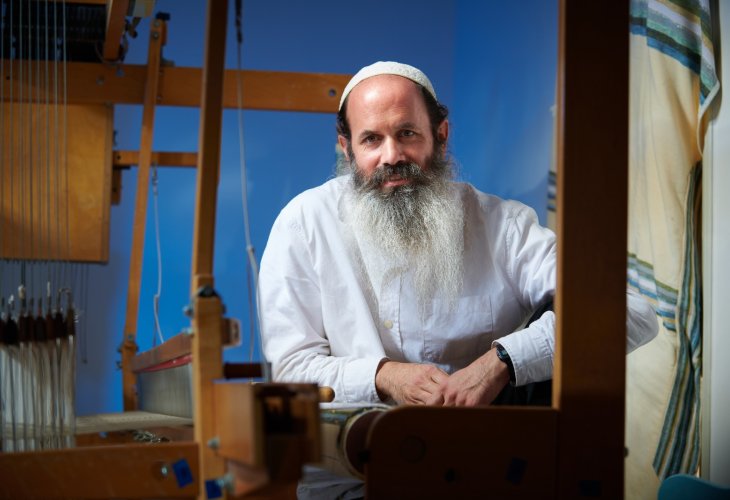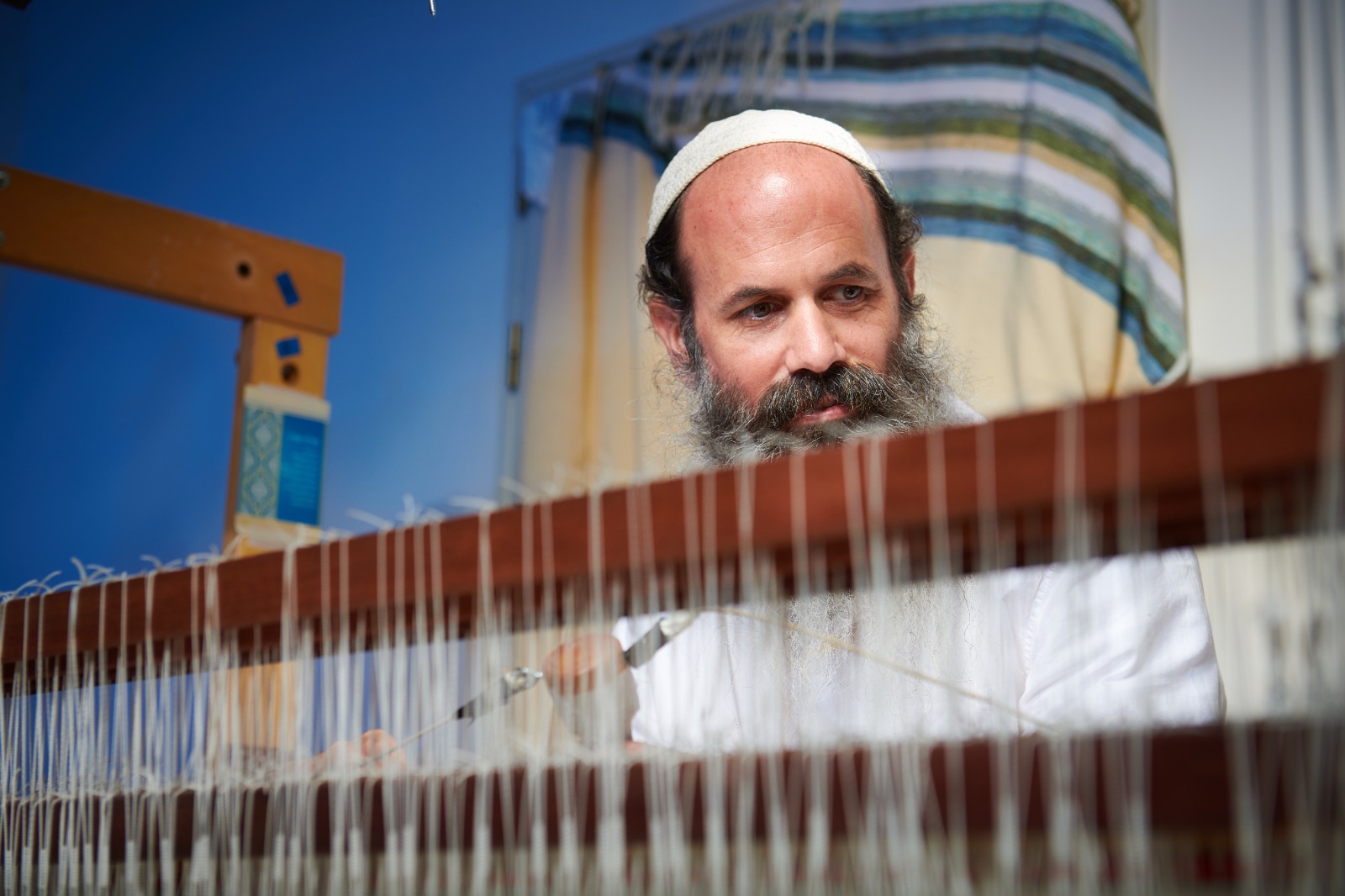The Tallit Weaver: "I Returned to Faith, But Then Faced the Upset of My Life"
Uri Paran grew up as a kibbutz boy, returned to faith, and started weaving tallits. But just when his future seemed promising, his world turned upside down with a diagnosis of cancer. "I've learned to thank Hashem in every situation," he says in an interview from his home, which has also become the center of his life's work.
 Uri Paran (Photo: Natali Cohen Kadosh)
Uri Paran (Photo: Natali Cohen Kadosh)Childhood in a kibbutz, return to faith, severe illness, and an oncology ward – these are just some of the elements intertwined in the fascinating conversation with Uri Paran. They are interwoven just like the wool threads he deals with throughout our conversation.
Uri Paran, as it turns out, is among the few in the country who practice weaving as a profession, and is considered almost the only one who weaves tallits by hand. Throughout our interview, he continues to pedal the loom device simultaneously, which helps him weave threads. The loom alternates up and down, and with his swift fingers, he completes the weaving work so that the warp threads connect with the weft threads. Yes, this has been his job for the last 15 years: weaving tallits.
"I Never Imagined the Truth Was So Close"
"It might be surprising, but I grew up as a kibbutz boy," he begins his story. "I was born in 'Givat Chaim Ihud', which was then a cooperative kibbutz. My parents were among the oldest residents in the kibbutz; my mother worked as a school principal and secretary, and my father worked with computers. My mother's parents were among the first founders of the kibbutz."
Uri surprises when he mentions that his grandparents came from Romania and were Vizhnitz Chassidim who strictly observed Halacha. "I didn't get to know them, but my mother told me they were the only ones in the kibbutz who observed mitzvot. To allow them to adhere, they were provided special foods in the dining hall, and separate utensils were kept for them. Their children, unfortunately, did not observe, and our next generation grew up without any knowledge on the subject. Even the little knowledge we had was skewed and incorrect, influenced by the spirit of the kibbutz."
Uri himself grew up as a kibbutz child in a culture of spiritual ignorance. "The interesting thing is that, even as a high school boy, I had friends who tried to delve into various spiritual matters and included me in their explorations. I don't think there was a book we encountered that we didn't examine in depth. We were willing to try everything, except for one thing we never considered – Judaism. It seemed so outdated and illogical to us. We searched for meaning without realizing it was so close to us."
Then, one day, Uri was shocked to discover his older brother returning home with a large kippah on his head. "This was a brother who was always so close to me; we used to walk together to the sea and have conversations on the beach, and suddenly finding out that he returned to faith – it was an immense shock, one might even say a disappointment," he says.
However, Uri soon realized that joint outings to the beach need not cease; they could simply be moved to Friday mornings. "We would go together to the beach, sit on the sand, and have deep conversations," he recalls. "These were the first times in my life that I heard about Judaism and began to understand what it contains. Suddenly, I realized it was not as intimidating as I thought. These were fascinating discussions."
But practically, life moved on strongly. Shortly after, Uri finished his military service and traveled across Europe and India. It was there, so far from home, with no one he knew around, that he received the enlightenment of his life.
"I saw magical places and met fascinating people, but deep inside, I understood that the truth wasn't with any of them. I understood it was waiting for me elsewhere. When I returned home, I already knew clearly that there is a Master of the Universe."
A Woolen Hat Instead of a Kippah
The first step he took upon his return to Israel was leaving the kibbutz. "I didn't want to continue living there; I felt it just didn't suit me. I moved to Rosh Pina, where I met wonderful people, especially Yitzhak Guetta, who teaches an alternative therapy method. I learned his method and strengthened in my return to faith, purely out of grace and love, not out of hardship," he emphasizes. "I returned to faith by choice and wholeheartedly."
But alongside his return to faith, he faced significant difficulty. "It was hard for me to wear a kippah," he admits. "I used to walk around with a kippah in my pocket and take it out occasionally when praying or blessing, but I didn't dare to appear with it in front of people, especially not at the kibbutz."
Still, he didn't want to give up head covering, so he found a simple solution: "It was winter months, so I just walked around with a woolen hat. It seemed reasonable and natural, but the big problem came with the arrival of summer, and then I had to find an alternative."
 (Photo: Natali Cohen Kadosh)
(Photo: Natali Cohen Kadosh)What did you do?
"At some point, I just took the plunge, and one day I appeared at the kibbutz with a kippah. I'll never forget my parents' faces. They were utterly in hysteria. Until then, they thought they had only one child who returned to faith, and suddenly they began to understand that I was also following suit."
How do you explain that your relationship with your parents remained strong? After all, there are quite a few families where the connection severs when children return to faith?
"That's true; I know such families too. But I'm sure it’s not related at all to my return to faith. From knowing all sides, I can say that generally, if a person who returns to faith had a good relationship with their parents beforehand, the connection remains and even strengthens, but if the relationship was problematic from the start, then the disconnection would be much more significant. In our case, thank G-d, there was always a mutual good connection, which fortunately accompanies us to this day."
Even today, with a family of four children, Uri continues to visit the kibbutz frequently. "My brother and his family also keep a good relationship with my parents. We really enjoy visiting them and feel welcome and loved."
"I Was in Shock, I Couldn't Believe I Was Sick"
As time went by and Uri found himself deeply in the process of returning to faith, he decided to leave Rosh Pina and move to Safed. "I wanted to live in a religious environment that would support my transition," he explains. "Like many returnees, I found it in Safed."
His work in the tallit field actually started before the move. "I didn’t want there to be questions, so, initially, I looked for a job and found one at a tallit factory, and thus told everyone I was moving to Safed because of the work."
The job he talks about was in a small workshop. "Initially, it took time to learn the weaving craft, but once I grasped the principle, I continued working with full energy. After a few months, I moved to Safed, allowing me not only to weave but also to learn at a nearby beit midrash. Those were wonderful days – I would study in the mornings and then go to work."
His match with his wife is a special one. "She actually comes from the south, from a religious family that strengthened," Uri recounts. "In the last years before we met, she was abroad, and apparently, we had no chance of meeting, but Hashem arranged it in a miraculous way. Thank G-d, we got married and lived in Safed for five years. Later, when we already had two daughters, we heard about new construction in the 'Shuva' moshav in the Gaza envelope, near my wife's parents. We felt it was an opportunity for us to build our own house, so we moved there. In the first years, we lived in caravans, but later we received land and built our house on it."
But just when Reb Uri and his family moved to the Shuva settlement and felt life was getting on track, the biggest upheaval of his life occurred.
"I developed cancer," he says, saying two shocking words. "For me, it was a shock. I couldn’t believe it was happening to me. In fact, it took time before the disease was identified, but after understanding 'this is it', I began to comprehend there are no two ways. I have to start treatments and at the same time learn to live with the disease."
He was hospitalized in Beilinson for a long period, and during those days, he discovered his unique connection with his friends from the kibbutz. "Although apparently, our paths parted, we kept in touch, and they were the first to help me," he says emotionally. "In the days when I was sick, they came to my house in Shuva and helped with all the renovations I had planned. Thus, after a long period, when I was finally released from the hospital, I had a pleasant surprise waiting for me. It moved me unimaginably."
It is also worth mentioning that dealing with the disease was not only a physical struggle but also a spiritual one. "I experienced a certain crisis," he admits. "I couldn’t understand what Hashem wanted from me and what He was trying to signal to me. What did I do wrong that I got this disease? As the days went by, I began to realize there is no point in questions and answers. If I am a believing Jew, I need to know that everything comes from Hashem, even if these are less pleasant things or don’t suit me. Gradually, I started to view my illness as a gift and even thanked for the pain. Even without understanding why, simply from the simple understanding that Hashem knows what He is doing, and it is for my good. I experienced very great moments of closeness to G-d. I'm sure I couldn’t have experienced them in any other way."
An Emotional Closure
Soon, Uri felt Hashem's embrace in a more tangible way. "Thank G-d, I completely recovered from the disease and continued to invest maximum effort in developing my tallit business, called ‘Talisman – Handwoven Tallitot’. I built a workroom at home and enjoy every time someone orders special tallits from me. For me, the sky's the limit, and I try to harness all my creativity to fulfill people's wishes. I was even privileged that my nephew, who lives in a kibbutz, and my father, wove their tallits with me. It greatly excited me. It felt like a circle had closed."
And he has a dream: "For years, I divided my day, with half the day learning in a kollel and the other half occupied with weaving tallits. Unfortunately, due to COVID, I had to furlough the worker who assisted me, so I need to invest more hours in the business. I hope very soon we'll be past this, and I can return to regular learning, because after all – that's the truly important thing in life."

